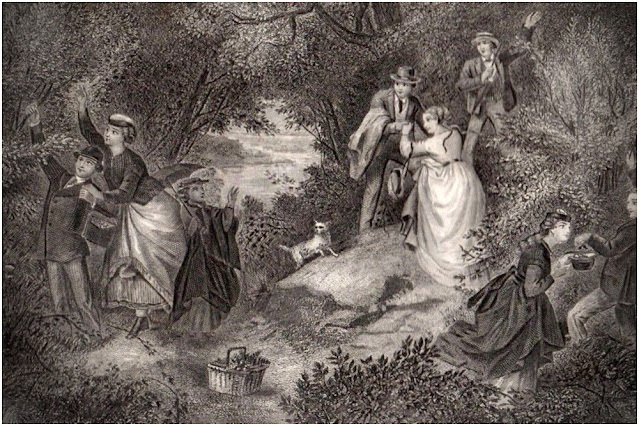'Hally Loo Day'
In September, following the exertions of gathering the harvest in and with the very first leaves just beginning to turn, the slide into the winter months would lay heavy on everyone’s minds. The need to gather and store every available resource was an obvious one, and nut trees in nearby woodland and ragged hedgerows presented an easily accessible autumnal bonus harvest of an oil rich source of protein, and a welcome additional animal food as well. Groups would set off into the woods with sticks to hook and shake the boughs, and blankets and baskets to catch and carry the fallen nuts.
For younger people these foraging sessions could be lively affairs, where groups of both sexes could escape into some privacy, a resource nearly impossible to find in among the busy coming and goings of their rural homes and farms. This freedom from the oversight of parental and authority figures lent a slightly scandalous air to the activities, and any couples coming back late, separated from their peer group as they had set out, might, if they didn’t take care about their route and appearance, could cause gossiping village tongues to wag. On the evidence of experience, knowing adults may have been heard to exclaim “A good year for nuts, a good year for babies.”
 |
| Beech leaves and nut, Summer and Autumn. Lithograph by William Henry James Boot. |
So while we can ponder what kind of ‘grief’ William Bowskin was referring to, it might be no surprise that Old Nick himself would lend a hand. And he would be handy today, as in Lincolnshire, and other parts of the UK, it was said the Devil himself made this his annual day to go nutting. In 1825, poet John Clare wrote in a letter to his friend William Hone.
“ On Holy Rood Day it is faithfully and confidently believed by both old and young that the Devil goes a-nutting on that day and I have heard many people affirm that they once thought it a tale till they ventured to the woods on that day when they smelt such a strong smell of brimstone as nearly stifled them before they could escape out again… ”
In fact the expression “ It’s a black as the div’ls nutting bag ” is still sometimes heard even today in Lincolnshire, when referring to either somewhere dark, or an article that is dirty or dingy.
The origin of the slightly odd name provincial for today, was with a child's impeccable logic is here inferred by a man from Swineshead who remembering his youth in the 1920s said
“ When I was a choir boy the day was called ‘Ally Loo Day' on account of the number of hymns we sang that day that contained the word hallelujah. I think the Wesleyan hymns for that day had even more ‘ally loos’! [2]
---------------------------




Comments
Post a Comment